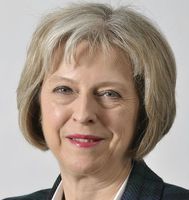UK Prime Minister, former Home Secretary, British Conservative politician
Theresa had a varied education spanning both the state and private sectors, and both grammar school and comprehensive school. She read Geography at St Hugh’s College, Oxford University. She started her career at the Bank of England and went on to hold posts at the Association for Payment Clearing Services (APACS) as Head of the European Affairs Unit and Senior Adviser on International Affairs. Theresa has been involved in politics at all levels for many years, starting out stuffing envelopes at her local Conservative Association before going on to be a councillor in the London Borough of Merton from 1986 to 1994. During that time she was Chairman of Education between 1988 and 1990 and Deputy Group Leader and Housing Spokesman between 1992 and 1994. Theresa was elected Member of Parliament for Maidenhead in May 1997. She lives in the constituency and is an active local campaigner. Her local activity has included campaigns to improve the local train service, bring a minor injuries unit to St Marks Hospital, and improve Maidenhead town centre. She has held several positions within Parliament since 1997. She was a member of the Shadow Cabinet from 1999 to 2010, including as Shadow Secretary of State for Education and Employment, Shadow Secretary of State for Work and Pensions, and Shadow Leader of the House of Commons. From 2002 to 2003 she was the first female Chairman of the Conservative Party. Theresa was appointed Home Secretary in May 2010. In this role she is leading the Government’s work to free up the police to fight crime more effectively, secure the borders and reduce immigration, and protect the UK from terrorism. She was also Minister for Women & Equalities from 2010 to 2012. ON CLIMATE CHANGE: May has been largely silent on the issue, and her recent voting record mirrors that of the party. In the last parliament May supported the badger cull, and was one of only 30 Tory MPs to abstain in the vote on allowing fracking under national parks, held before Christmas. During a speech made just before Andrea Leadsom’s exit for the Tory leadership in July 2016, May said: “I want to see an energy policy that emphasises the reliability of supply and lower costs for users.” But a 2008 document reacting to the passing of the Climate Change Act, May states: “I am thrilled to see that after years of Conservative pressure, we have finally passed a necessary and ambitious piece of legislation on Climate Change. Britain is the first country in the world to formally bind itself to cut greenhouse emissions and I strongly believe this will improve our national and economic security. To stay reliant on fossil fuels would mean tying ourselves to increasingly unstable supplies which could endanger our energy security and the Climate Change and Energy Bills mark an important step for both the health of our economy and the health of our nation. It is now vital that we stick to these targets. I will continue to put pressure on the Government over the third runway at Heathrow as an extra 222,000 flights a year would undermine our national targets and seriously damage the health of the local community.” Meanwhile, the climate science denying Global Warming Policy Foundation published an article asking whether May is a climate sceptic, highlighting her voting against setting a decarbonisation target for the UK and against carbon capture and storage as well as against applying the Climate Change Levy tax to electric vehicles generated from renewables.
